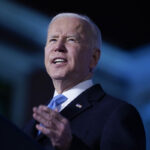
Britain could lift sanctions crippling Russia if Vladimir Putin withdraws from Ukraine and commits to “no further aggression”, Liz Truss has said.
In an interview with The Telegraph, the Foreign Secretary set out a blueprint for the so-called “off ramp” that the Russian president could be offered to halt his assault on Ukraine.
Ms Truss – who revealed that she has established a “negotiations unit” in the Foreign Office to aid future peace talks – said sanctions on Russian banks, firms and oligarchs could be lifted in the event of “a full ceasefire and withdrawal”.
Putin would also have to agree to refrain from future military aggression, with the threat of “snapback sanctions” which could instantly be slapped back onto Russia.
Ms Truss’ intervention is the first official confirmation that Britain could lift its sweeping sanctions as part of a peace settlement between Russia and Ukraine.
It marks a shift from earlier remarks in which the Foreign Secretary said she could not see a situation in which Roman Abramovich, the most prominent of the sanctioned oligarchs, would be allowed to come to the UK again.
Her latest comments chime with remarks by Antony Blinken, the US secretary of state, who said that US sanctions against Russia were “not designed to be permanent” and could “go away” if Moscow changes its behaviour.
The interview comes after the Kremlin gave its first indication that it plans to scale back its invasion – as an army chief said Moscow’s “main goal” was now the “liberation” of the Donbas region, on the eastern border with Russia.
On Saturday, the Ministry of Defence said Russian forces were increasingly reliant on indiscriminate air and artillery bombardments, as they were “proving reluctant to engage in large scale urban infantry operations”.
[embedded content]
Ms Truss also:
Ms Truss said Western leaders had previously been “naive” in their approach to Putin and had engaged in “wishful thinking.”
She added: “What we know is that Russia signed up to multiple agreements they simply don’t comply with. So there needs to be hard levers. Of course, sanctions are a hard lever.
“Those sanctions should only come off with a full ceasefire and withdrawal, but also commitments that there will be no further aggression. And also, there’s the opportunity to have snapback sanctions if there is further aggression in future. That is a real lever that I think can be used.”
Since the start of the war, negotiating teams from Russia and Ukraine have met several times in Belarus.
Volodymyr Zelensky, the Ukrainian president, has conceded that Ukraine will never join Nato, a key Russian demand, as the starting point of a peace deal.
But he has promised a referendum on any “potentially historic changes” and has insisted that Ukraine would not agree to give up any of its territory for the sake of peace.
The Kremlin is demanding that any peace deal should include Ukraine recognising the independence of the Donetsk and Luhansk regions, which have been occupied by pro-Russian separatists since 2014.
It is understood that Ms Truss backs Mr Zelensky’s demands.
A source close to Ms Truss added: “Russia has shown it simply does not abide by international rules and treaties, so any agreement needs to come with an incentive not to break it.
“The threat of sanctions snapping back is a mechanism that Liz is keen on.
“Sanctions have had a crippling effect so far on the Russian economy, so the prospect of them snapping back would be a significant deterrence to future aggression or rule-breaking.”
Under the Homes for Ukraine scheme, individuals can sponsor named Ukrainians to come to the UK, by offering them accommodation for at least six months.


Ms Truss revealed that the Government is in talks with Polish officials to use free Sim cards being handed to refugees entering Poland, to advertise the UK scheme.
Under the plans, Ukrainian refugees who use the Sim cards being offered by Polish operators would receive text messages advertising the scheme.
Ms Truss said it would mean that Ukrainians “have immediate access, as they go over the border, to the scheme we’re offering in the UK”.
Asked about Putin’s potential use of chemical weapons, Ms Truss said: “That would represent an escalation of this appalling conflict. We’ve already seen abhorrent acts committed against civilians in Ukraine, but the use of chemical weapons would represent an escalation and there would be a response.”
Ms Truss said tax cuts were “very, very important”.
She added: “Ultimately, the way to get the cost of living down in the long-term is supply side reform, and it’s doing what we need to do to generate economic growth.
“And whether it’s on making childcare more affordable, which I’ve long been a champion of, whether it’s making housing more affordable, that is ultimately what will bring down the cost of living.”




